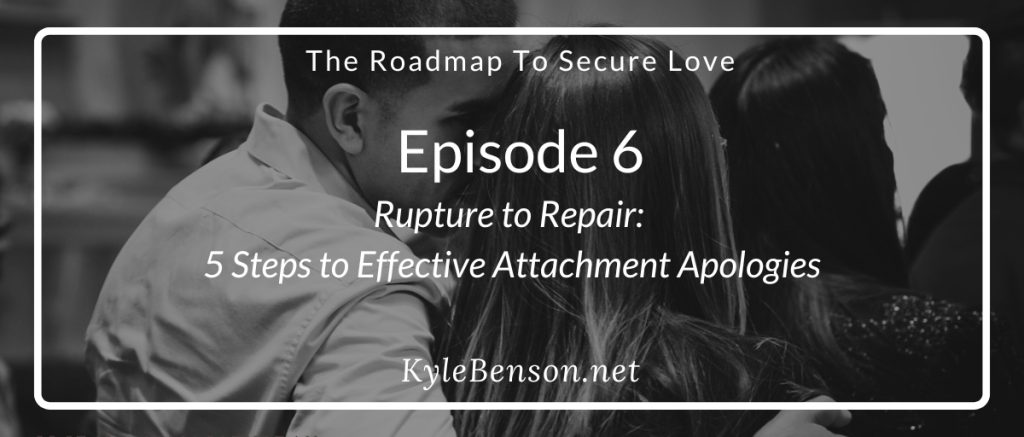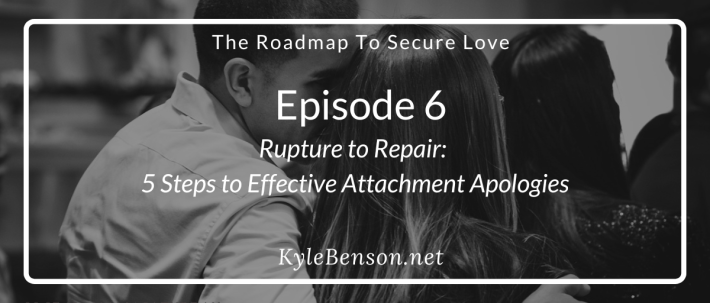5 Steps to Effective Attachment Apologies


In relationships, it is not the missteps that dictate the rhythm of the partnership, but how partners recover from those missteps. Conflict is a natural part of any relationship, but the challenge lies in navigating these conflicts to strengthen, rather than weaken, the bond. On The Roadmap to Secure Love’s latest podcast episode, “Rupture to Repair,” we dive deep into the transformative power of attachment theory to mend these emotional ruptures.
Here’s an exploration of the typical challenges couples face and the key insights that can help them move forward.
Understanding Emotional Ruptures
Relationships are tested not by the presence of conflict but by the persistence of unresolved issues. Emotional ruptures occur when conflicts, misunderstandings, or hurt feelings disrupt the relational balance. If these ruptures are not addressed, they can create lasting barriers to intimacy and trust. Many couples struggle with the repair process because they lack the tools to effectively navigate the emotional complexities that arise from these conflicts.
The purpose of a repair is to learn about each other and foster deeper levels of emotional intimacy from our missteps. It’s all about growth.
Repairs, at their heart, are about creating deeper understanding. When these conversations all play out in the way that I hope, repairs contribute to greater levels of connection.
Julie Menanno, Secure Love: Create a Relationship That Last a Lifetime
Emotionally Focused Therapy as a Path
Emotionally Focused Therapy, developed by Dr. Sue Johnson, offers a structured approach to healing emotional wounds within relationships. EFT is rooted in attachment theory, which emphasizes the biological need for strong, secure connections with loved ones. This therapeutic approach focuses on rebuilding broken bonds and reestablishing trust through emotional openness and responsiveness.
Key Takeaways from “Rupture to Repair” episode
1. The Power of Listen to Understand the Impact
A crucial step in resolving conflicts is acknowledging the emotional impact of our actions. During the podcast, it is emphasized that acknowledging how our behavior has made our partner feel is essential for moving towards reconciliation. But before we can acknowledge our behavior in a way that makes an effective repair, we first must understand why it negatively impacted our partner, despite our often positive intentions. This process involves listening actively and empathizing deeply, validating the partner’s feelings without immediately jumping to defense or counterarguments.
The reason is, if we try to apologize for what we think the impact is and it’s not what our partners is feeling, they will perceive our tries as defensive, rather than attempts to repair. By listening to understand the impact it had on our partner, we gain the material needed to organize an effective repair.
Here are some questions we can ask:
- How did this hurt?
- Can you help me understand how [my action/behavior] impacted you?
- Can you share how this impacted you so I can understand and love you better going forward?
2. Crafting Effective Apologies
A meaningful apology is one that resonates with the partner’s emotional state and addresses the hurt caused. Crafting “attachment apologies” demonstrate an understanding of the emotional pain inflicted and then show remorse and a commitment to do better, which can significantly aid the repair process for our partner.
3. Five Steps from Rupture to Repair
Kim and Kyle outline a five-step method to repair relationships with our partners after we understand the impact:
- Recognize and acknowledge the emotional impact of your actions.
- Validate the impact and feelings of your partner
- Share the intention that did not land for your partner
- Share regret or remorse for the impact and say sorry.
- Share an action plan going forward to repair and demonstrate care and trust
4. Applying Attachment Theory Across All Relationships
The principles of Attachment Theory are not limited to romantic partnerships but can be universally applied to any interpersonal relationship. Understanding how to apply these principles can improve familial bonds, friendships, and professional relationships, promoting healthier and more fulfilling interactions.
5. The Importance of Continuous Practice
Repairing a rupture through attachment theory is not a one-time effort but a continuous practice. Relationships evolve, and as they do, new challenges will arise. The commitment to applying the lessons of EFT consistently can turn ruptures into opportunities for strengthening bonds.
For more insights into enhancing your relationships through proven psychological methods, stay tuned to The Roadmap to Secure Love. Let’s continue to grow, learn, and connect, one episode at a time.
Listen to Previous Episodes:
FAQ for “Rupture to Repair” Podcast Episode
1. What is the main focus of the “Rupture to Repair” episode?
The episode explores how attachment theory can help couples navigate and repair emotional conflicts to strengthen their relationships.
2. What are emotional ruptures?
Emotional ruptures occur when conflicts, misunderstandings, or hurt feelings disrupt the relational balance, potentially creating barriers to intimacy and trust if not addressed.
3. What is the key to effective repair in relationships?
Effective repair involves understanding the emotional impact of your actions on your partner, offering meaningful apologies, and committing to behavior changes that rebuild trust.
4. What are the five steps from rupture to repair in relationships?
- Recognize and acknowledge the emotional impact of your actions.
- Validate your partner’s feelings.
- Share your positive intentions.
- Express regret or remorse and apologize.
- Develop an action plan for future behavior.
5. How can attachment theory principles be applied beyond romantic relationships?
Attachment theory principles can improve familial bonds, friendships, and professional relationships by fostering healthier and more empathetic interactions.

